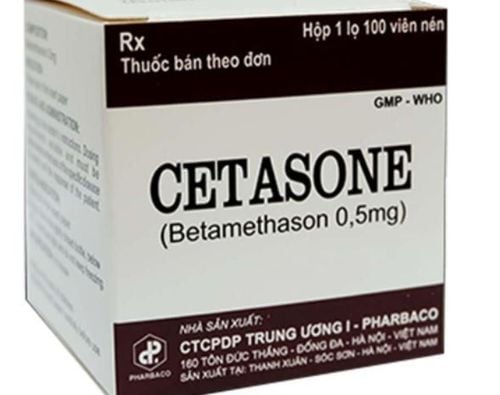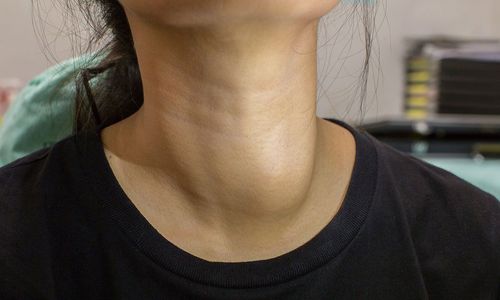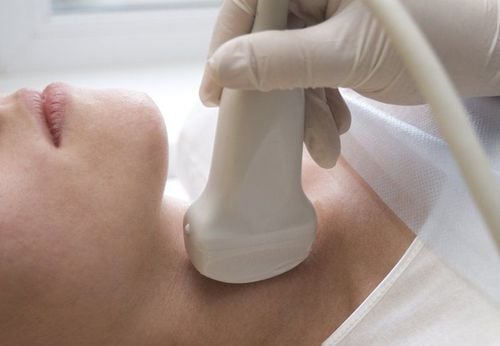This is an automatically translated article.
The thyroid is a small gland located at the base of the throat (near the Adam's apple) that regulates bodily functions such as heart rate, metabolism, and how quickly the body burns calories. A thyroid nodule is a tumor in the thyroid gland in the neck. More than 90% of thyroid nodules are benign (not cancerous). Some are actually fluid-filled cysts.
1. What is a thyroid cyst?
Thyroid cysts represent fluid-filled enlargements of the thyroid gland, which can be small (less than 1 cm) or quite large and sometimes arise very suddenly. By definition, cysts contain fluid. Thyroid nodules that are purely cystic, in which case there is no detectable solid component in the fluid, are mostly benign. Thyroid cysts are more complex and contain both solid and liquid components called various things including complex cysts, mixed echogenic nodules etc. Complicated cysts, like any other thyroid nodule, should be evaluated by specialists in ultrasound and cytology when biopsy or cytology is indicated.
2. Are thyroid cysts dangerous?
Doctors aren't sure why so many people get thyroid cysts. In general, thyroid cysts can develop when ducts become blocked and fluid becomes trapped in one area. Cyst growth is also related to hormone activity and some thyroid cysts contain hormone colloid, which is produced in the thyroid gland.
3. Are thyroid cysts cancerous?
More than 95% of thyroid cysts are benign (not cancerous). If you are concerned about the possibility of cancer, your doctor may simply monitor the nodule over time to see if it grows.
Ultrasound can help evaluate thyroid nodules and determine the need for biopsy. A fine-needle aspiration biopsy of the thyroid can collect samples of cells from the nodule, which, under a microscope, can give your doctor more information about the cyst's activity.

Người bệnh cần quan tâm đến tình trạng nang tuyến giáp và cách điều trị
4. Symptoms of Thyroid Cysts
In most cases, people with thyroid cysts do not experience any symptoms. In fact, this is true for most types of thyroid nodule.
However, you may experience symptoms if the cyst grows so large that it puts pressure on other organs in your neck. These symptoms may include: difficulty breathing, difficulty swallowing, voice changes. Some patients also have neck pain or a palpable lump.
5. Diagnosis of thyroid cysts
After your doctor finds a thyroid cyst or suspects you may have a thyroid cyst, he or she will likely order further testing. This will help you better understand the cyst, so you can choose the treatment that's right for you.
The test will determine whether the cyst is fluid-filled or complex and whether it is benign or cancerous.
Further tests for thyroid cysts include:
5.1. Supersonic
Thyroid cysts are usually detected during ultrasound. Ultrasound can provide important information about the composition of the cyst. This is because materials of different densities such as solids and liquids show up as different shades on ultrasound.
A radiologist will get an idea of the composition of the cyst just by reading the images. Your doctor will also determine the size and location of the cyst. That's important because larger cysts are more likely to be cancerous or cause symptoms.
5.2. Biopsy
If your doctor sees something related to the ultrasound, they may choose to do a fine-needle aspiration biopsy. During this process:
A very fine needle is inserted through your neck into the thyroid cyst, using ultrasound imaging to guide the needle.
The cells from that sample are then analyzed under a microscope. micro to determine if any cells are cancerous. Fine-needle aspiration biopsy most commonly used for cysts: Over 1.5 cm and so complicated that raises your doctor's concerns.
6. How to treat thyroid cysts?
Even a benign growth on your thyroid gland can cause symptoms. If a thyroid nodule is causing problems with speech or swallowing, your doctor may recommend surgical treatment to remove all or part of the thyroid gland.
If your doctor recommends removing your thyroid gland (thyroidectomy), you may not even have to worry about a scar on your neck. Some patients are good candidates for a scarless thyroid procedure, in which the surgeon accesses the thyroid gland through an incision on the inside of your lower lip.
A newer alternative that doctors can use to treat benign nodules in an office setting is called radiofrequency ablation (RFA). Radiofrequency ablation uses a probe to reach the benign nodule under ultrasound guidance, and then treats it with electrical current and heat to shrink the nodule. It's simple: Most people treated with RFA return to normal activities the next day without problems.
To achieve the highest diagnostic and treatment efficiency, Vinmec International General Hospital has equipped with the most modern imaging equipment system today, typically the GE Healthcare S9 ultrasound machine with transducer Flat, high frequency, HD resolution for clear images. High-frequency ablation technique to treat thyroid tumors under ultrasound guidance allows the doctor to control the entire procedure, minimizing damage to blood vessels, nerves, trachea, esophagus, so it is very safe. and at the same time completely burned the tumor.
Periodically after 1 - 3 - 6 - 12 months, the patient will be re-examined with an endocrinologist and radiologist who has directly performed the procedure for the most accurate and objective assessment results. . If you have a need for consultation and examination at Vinmec hospitals across the country, please book an appointment on the website for service.
Please dial HOTLINE for more information or register for an appointment HERE. Download MyVinmec app to make appointments faster and to manage your bookings easily.













